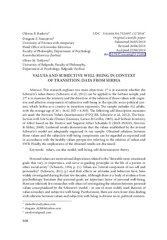Приказ основних података о документу
Vrednosti i subjektivna dobrobit u kontekstu tranzicije - podaci iz Srbije
Values and subjective well-being in context of transition: Data from Serbia
| dc.creator | Radović, Olivera B. | |
| dc.creator | Stanojević, Dragana Z. | |
| dc.creator | Tošković, Oliver | |
| dc.date.accessioned | 2021-10-12T13:00:52Z | |
| dc.date.available | 2021-10-12T13:00:52Z | |
| dc.date.issued | 2019 | |
| dc.identifier.issn | 0085-6320 | |
| dc.identifier.uri | http://reff.f.bg.ac.rs/handle/123456789/2830 | |
| dc.description.abstract | Ovo istraživanje je imalo dva osnovna cilja: (1) ispitati da li se Švarcov model vrednosti (Schwartz et al., 2012) replikuje i na srpskom uzorku, i (2) ispitati intenzitet i smer povezanosti tih vrednosti sa kognitivnom i afektivnom komponentom subjektivne dobrobiti u specifičnom socijalnopolitičkom kontekstu koji Srbija, kao zemlja u tranziciji, predstavlja. Uzorkom je obuhvaćeno 412 odraslih ispitanika, prosečnog uzrasta M = 34,42 (SD =6,305). Koristili smo sledeće samoopisne mere: PVQ-RR (Schwartz, et al. 2012), skalu zadovoljstva životom (Diener, Emmons, Larsen & Griffin, 1985) i SIAB-PANAS (Novović, Mihić, 2008). Dobijeni rezultati pokazuju da se vrednosti postulirane revidiranim Švarcovim modelom adekvatno raspoređuju i na našem uzorku. Dobijene korelacije između tih vrednosti i komponenti subjektivne dobrobiti mogu se smatrati očekivanim i u skladu su sa perspektivom "zdravih vrednosti" o odnosu vrednosti i subjektivne dobrobiti. Na kraju, diskutovane su implikacije dobijenih rezultata. | sr |
| dc.description.abstract | This research explores two main objectives: 1st is to examine whether the Schwartz's value theory (Schwartz et al., 2012) can be applied to the Serbian sample, and 2nd is to examine the intensity and the direction of the relation of those values with cognitive and affective components of subjective well-being in the specific socio-political context, which Serbia as a country in transition represents. The sample includes 412 adults, with the average age of M = 34.42 (SD = 6.305). The following self-description measures are used: the Portraits Values Questionnaire (PVQ-RR, Schwartz et al., 2012), The Satisfaction with Life Scale (Diener, Emmons, Larsen & Griffin, 1985), and Serbian Inventory of Affect based on the Positive and Negative Affect Schedule-X (SIAB-PANAS, Novović & Mihić, 2008). Gathered results demonstrate that the values established by the revised Schwartz's model are adequately organized in our sample. Obtained relations between those values and the subjective well-being components can be regarded as expected and in accordance with the healthy values perspective referring to the relation of values and SWB. Finally, the implications of the obtained results are discussed. | en |
| dc.publisher | Sociološko društvo Srbije, Beograd | |
| dc.rights | openAccess | |
| dc.rights.uri | https://creativecommons.org/licenses/by-sa/4.0/ | |
| dc.source | Sociološki pregled | |
| dc.subject | vrednosti | sr |
| dc.subject | teorija samoodređenja | sr |
| dc.subject | subjektivna dobrobit | sr |
| dc.subject | kružni model | sr |
| dc.subject | well-being | en |
| dc.subject | values | en |
| dc.subject | self-determination theory | en |
| dc.subject | circular model | en |
| dc.title | Vrednosti i subjektivna dobrobit u kontekstu tranzicije - podaci iz Srbije | sr |
| dc.title | Values and subjective well-being in context of transition: Data from Serbia | en |
| dc.type | article | |
| dc.rights.license | BY-SA | |
| dc.citation.epage | 942 | |
| dc.citation.issue | 3 | |
| dc.citation.other | 53(3): 908-942 | |
| dc.citation.rank | M24 | |
| dc.citation.spage | 908 | |
| dc.citation.volume | 53 | |
| dc.identifier.doi | 10.5937/socpreg53-21692 | |
| dc.identifier.fulltext | http://reff.f.bg.ac.rs/bitstream/id/1508/2827.pdf | |
| dc.type.version | publishedVersion |

